A+ Solutions
Get all your Exams at affordable prices while guaranteeing you get to pass your exams.
- 532
- 0
- 23
Community
- Followers
- Following
556 items
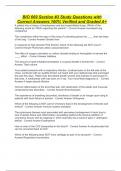
BIO 669 Section #3 Study Questions with Correct Answers 100% Verified and Graded A+
BIO 669 Section #3 Study Questions with Correct Answers 100% Verified and Graded A+ A patient has a history of emphysema and has hyperinflated lungs. Which of the following would be TRUE regarding this patient? - Correct Answer Increased lung compliance The compliance within the apex of the lung of a standing person be ____ than the base of the lung - Correct Answer Greater than In response to high alveolar PO2 (PaO2), which of the following will NOT occur? - Correct Answer Pulmonary arte...
- Package deal
- Exam (elaborations)
- • 8 pages •
BIO 669 Section #3 Study Questions with Correct Answers 100% Verified and Graded A+ A patient has a history of emphysema and has hyperinflated lungs. Which of the following would be TRUE regarding this patient? - Correct Answer Increased lung compliance The compliance within the apex of the lung of a standing person be ____ than the base of the lung - Correct Answer Greater than In response to high alveolar PO2 (PaO2), which of the following will NOT occur? - Correct Answer Pulmonary arte...
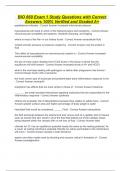
BIO 669 Exam 1 Study Questions with Correct Answers 100% Verified and Graded A+
BIO 669 Exam 1 Study Questions with Correct Answers 100% Verified and Graded A+ papilledema indicates - Correct Answer increased intercranial pressure hypocalcemia will result in which of the following signs and symptoms - Correct Answer neuromuscular excitability and spasms, intestinal cramping, and tingling where is most of the Na+ in our bodies found - Correct Answer extracellular fluid Colloid osmotic pressure is pressure created by - Correct Answer only the protein in fluid Thr...
- Package deal
- Exam (elaborations)
- • 6 pages •
BIO 669 Exam 1 Study Questions with Correct Answers 100% Verified and Graded A+ papilledema indicates - Correct Answer increased intercranial pressure hypocalcemia will result in which of the following signs and symptoms - Correct Answer neuromuscular excitability and spasms, intestinal cramping, and tingling where is most of the Na+ in our bodies found - Correct Answer extracellular fluid Colloid osmotic pressure is pressure created by - Correct Answer only the protein in fluid Thr...
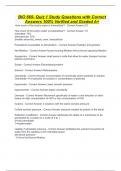
BIO 669- Quiz 1 Study Questions with Correct Answers 100% Verified and Graded A+
BIO 669- Quiz 1 Study Questions with Correct Answers 100% Verified and Graded A+ How much of the body's water is intracellular? - Correct Answer 2/3 How much of the body's water is extracellular? - Correct Answer 1/3 Interstitial: 75% Intravascular: 25% Smaller amountsL sweat, urine, transcellular Populations susceptible to dehydration: - Correct Answer Pediatric and geriatric Net filtration - Correct Answer forces favoring filtration minus forces opposing filtration Aquaporin...
- Package deal
- Exam (elaborations)
- • 12 pages •
BIO 669- Quiz 1 Study Questions with Correct Answers 100% Verified and Graded A+ How much of the body's water is intracellular? - Correct Answer 2/3 How much of the body's water is extracellular? - Correct Answer 1/3 Interstitial: 75% Intravascular: 25% Smaller amountsL sweat, urine, transcellular Populations susceptible to dehydration: - Correct Answer Pediatric and geriatric Net filtration - Correct Answer forces favoring filtration minus forces opposing filtration Aquaporin...
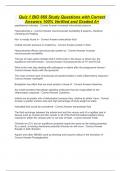
Quiz 1 BIO 669 Study Questions with Correct Answers 100% Verified and Graded A+
Quiz 1 BIO 669 Study Questions with Correct Answers 100% Verified and Graded A+ papiliedema indicates - Correct Answer increased intracranial pressure Hypocalcemia w - Correct Answer neuromuscular excitability & spasms, intestinal cramping and tingling Na+ is mostly found in - Correct Answer extracellular fluid Colloid osmotic pressure is created by - Correct Answer protein in fluid Hypocalcemia effects neuromuscular system by - Correct Answer increase neuromuscular excitability ...
- Package deal
- Exam (elaborations)
- • 3 pages •
Quiz 1 BIO 669 Study Questions with Correct Answers 100% Verified and Graded A+ papiliedema indicates - Correct Answer increased intracranial pressure Hypocalcemia w - Correct Answer neuromuscular excitability & spasms, intestinal cramping and tingling Na+ is mostly found in - Correct Answer extracellular fluid Colloid osmotic pressure is created by - Correct Answer protein in fluid Hypocalcemia effects neuromuscular system by - Correct Answer increase neuromuscular excitability ...
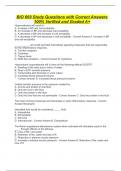
BIO 669 Study Questions with Correct Answers 100% Verified and Graded A+
BIO 669 Study Questions with Correct Answers 100% Verified and Graded A+ Hypernatremia will result in: A. Increase in BP and cell excitability B. An increase in BP and decrease cell excitability C. A decrease in BP and increase in cell excitability D. A decrease in BP and decrease in cell excitability - Correct Answer A. Increase in BP and cell excitability ___________ are small secreted intercellular signaling molecules that are responsible for the inflammatory response. A. Toll like r...
- Package deal
- Exam (elaborations)
- • 13 pages •
BIO 669 Study Questions with Correct Answers 100% Verified and Graded A+ Hypernatremia will result in: A. Increase in BP and cell excitability B. An increase in BP and decrease cell excitability C. A decrease in BP and increase in cell excitability D. A decrease in BP and decrease in cell excitability - Correct Answer A. Increase in BP and cell excitability ___________ are small secreted intercellular signaling molecules that are responsible for the inflammatory response. A. Toll like r...

Fluid and Electrolyte Balance/Acid Base Balance BIO 669 Northern Kentucky University Study Questions with Correct Answers 100% Verified
Fluid and Electrolyte Balance/Acid Base Balance BIO 669 Northern Kentucky University Study Questions with Correct Answers 100% Verified aldosterone is influenced by what? - Correct Answer circulating blood volume, blood pressure, plasma concentrations of sodium and potassium what is released when circulating blood volume of BP is decreased or sodium is decreased or potassium is increased? - Correct Answer renin is secreted and released by the kidneys renin stimulates the release of what? ...
- Exam (elaborations)
- • 9 pages •
Fluid and Electrolyte Balance/Acid Base Balance BIO 669 Northern Kentucky University Study Questions with Correct Answers 100% Verified aldosterone is influenced by what? - Correct Answer circulating blood volume, blood pressure, plasma concentrations of sodium and potassium what is released when circulating blood volume of BP is decreased or sodium is decreased or potassium is increased? - Correct Answer renin is secreted and released by the kidneys renin stimulates the release of what? ...
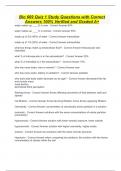
Bio 669 Quiz 1 Study Questions with Correct Answers 100% Verified and Graded A+
Bio 669 Quiz 1 Study Questions with Correct Answers 100% Verified and Graded A+ water makes up ____% in men - Correct Answer 60% water makes up ____% in women - Correct Answer 50% made up of 2/3 (40%) of water - Correct Answer intracellular made up of 1/3 (20%) of water - Correct Answer extracellular what two things make up extracellular fluid? - Correct Answer Intravascular and interstitial what % of intravascular is in the extracellular? - Correct Answer 25% what % of inters...
- Package deal
- Exam (elaborations)
- • 13 pages •
Bio 669 Quiz 1 Study Questions with Correct Answers 100% Verified and Graded A+ water makes up ____% in men - Correct Answer 60% water makes up ____% in women - Correct Answer 50% made up of 2/3 (40%) of water - Correct Answer intracellular made up of 1/3 (20%) of water - Correct Answer extracellular what two things make up extracellular fluid? - Correct Answer Intravascular and interstitial what % of intravascular is in the extracellular? - Correct Answer 25% what % of inters...
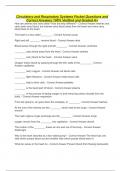
Circulatory and Respiratory Systems Packet Questions and Correct Answers 100% Verified and Graded A+
Circulatory and Respiratory Systems Packet Questions and Correct Answers 100% Verified and Graded A+ How are arteries and veins alike? How are they different? - Correct Answer Arteries and veins both carry blood, but arteries carry blood away from the heart and veins carry blood back to the heart. The heart is a two sided ________ - Correct Answer pump Right and left ________ receive blood - Correct Answer atria Blood leaves through the right and left ________ - Correct Answer ventricl...
- Package deal
- Exam (elaborations)
- • 4 pages •
Circulatory and Respiratory Systems Packet Questions and Correct Answers 100% Verified and Graded A+ How are arteries and veins alike? How are they different? - Correct Answer Arteries and veins both carry blood, but arteries carry blood away from the heart and veins carry blood back to the heart. The heart is a two sided ________ - Correct Answer pump Right and left ________ receive blood - Correct Answer atria Blood leaves through the right and left ________ - Correct Answer ventricl...
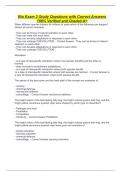
Bio Exam 2 Study Questions with Correct Answers 100% Verified and Graded A+
Bio Exam 2 Study Questions with Correct Answers 100% Verified and Graded A+ When different species interact for millions of years which of the following can happen? (Select all correct answers) - They can be forces of natural selection on each other. - They can mate with each other. - They can develop adaptations in response to each other. - They can undergo COEVOLUTION. - Correct Answer - They can be forces of natural selection on each other. - They can develop adaptations in response t...
- Package deal
- Exam (elaborations)
- • 14 pages •
Bio Exam 2 Study Questions with Correct Answers 100% Verified and Graded A+ When different species interact for millions of years which of the following can happen? (Select all correct answers) - They can be forces of natural selection on each other. - They can mate with each other. - They can develop adaptations in response to each other. - They can undergo COEVOLUTION. - Correct Answer - They can be forces of natural selection on each other. - They can develop adaptations in response t...
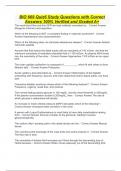
BIO 669 Quiz6 Study Questions with Correct Answers 100% Verified and Graded A+
BIO 669 Quiz6 Study Questions with Correct Answers 100% Verified and Graded A+ The renal blood flow and this GFR are kept relatively consistent by: - Correct Answer Myogenic (intrinsic) autoregulation Which of the following is NOT a consistent finding in nephrotic syndrome? - Correct Answer Hypertension and vasoconstriction Which of the following does not stimulate aldosterone release? - Correct Answer Arterial natriuretic peptide Assume that fluid enters the distal tubule with an osmo...
- Package deal
- Exam (elaborations)
- • 4 pages •
BIO 669 Quiz6 Study Questions with Correct Answers 100% Verified and Graded A+ The renal blood flow and this GFR are kept relatively consistent by: - Correct Answer Myogenic (intrinsic) autoregulation Which of the following is NOT a consistent finding in nephrotic syndrome? - Correct Answer Hypertension and vasoconstriction Which of the following does not stimulate aldosterone release? - Correct Answer Arterial natriuretic peptide Assume that fluid enters the distal tubule with an osmo...
